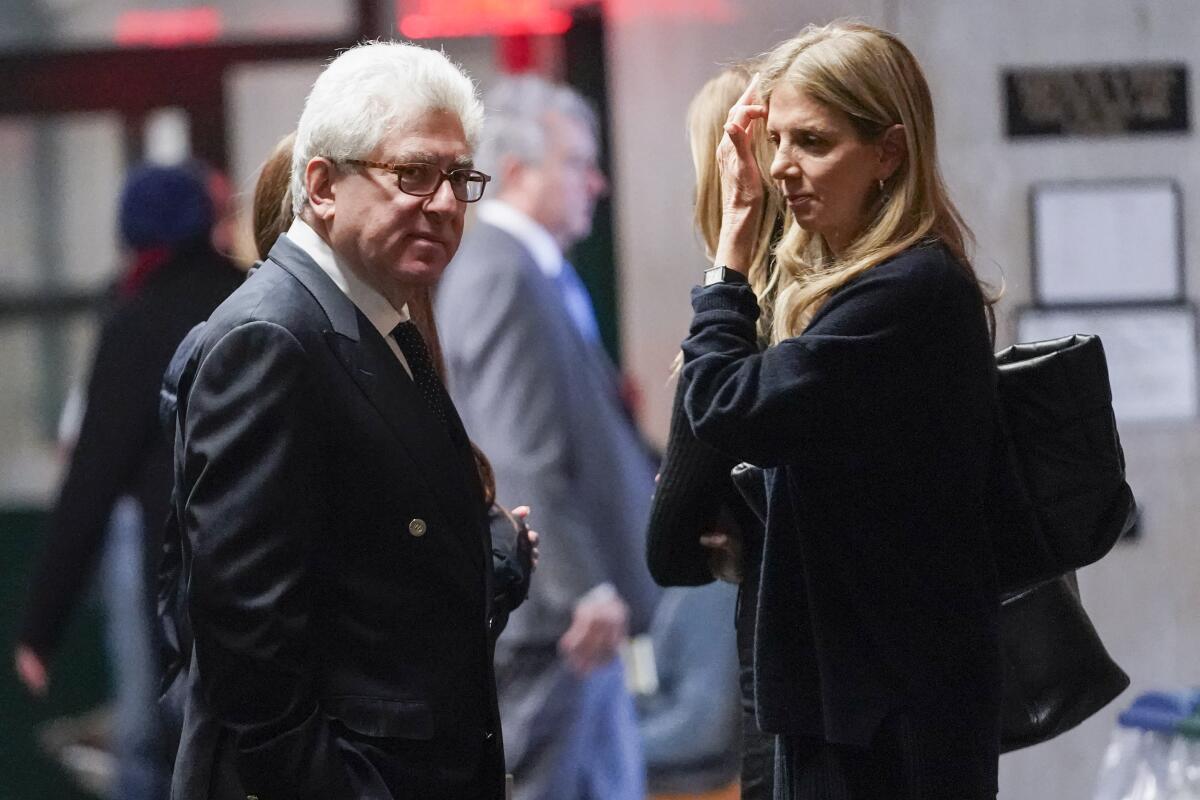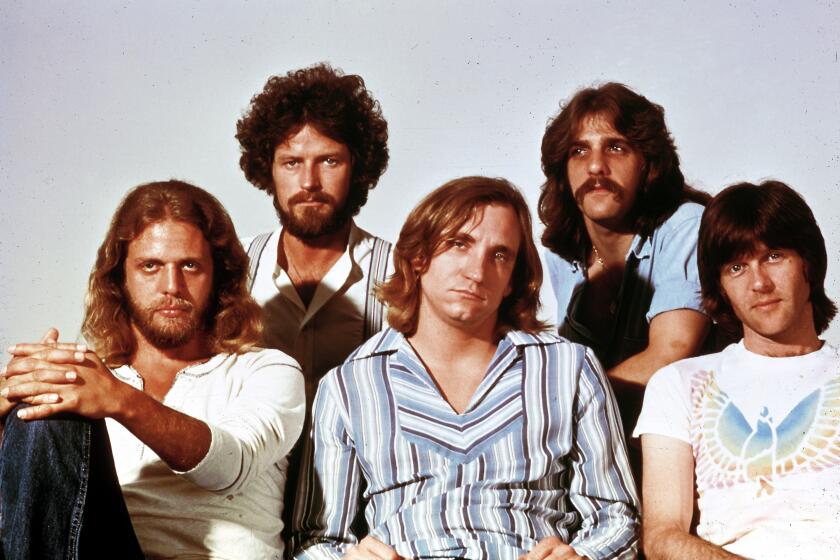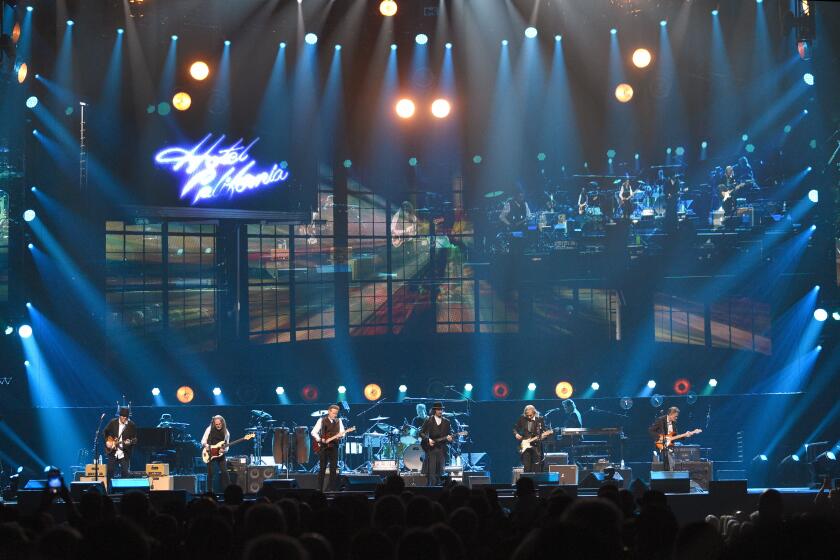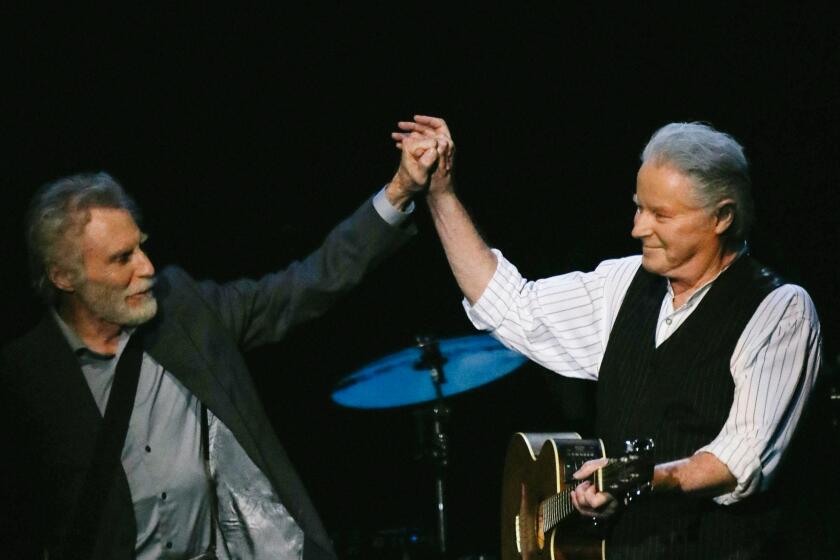Criminal case over handwritten lyrics to ‘Hotel California’ goes to trial

- Share via
NEW YORK — A criminal case involving handwritten lyrics to the classic rock megahit “Hotel California” and other Eagles favorites went to trial Wednesday in New York, with three men accused of scheming to thwart band co-founder Don Henley’s efforts to reclaim the allegedly ill-gotten documents.
The trial concerns about 100 pages of drafts of the words to songs from the 1976 release “Hotel California,” which is the third-biggest selling album ever in the U.S.
Glenn Horowitz, a rare books dealer; former Rock & Roll Hall of Fame curator Craig Inciardi; and memorabilia seller Edward Kosinski face charges including conspiracy to possess stolen property.
“The defendants were not businessmen acting in good faith, but criminal actors,” Manhattan Dist. Atty. Nicholas Penfold said in his opening statement. He said they “deceived and manipulated to try to frustrate” Henley’s efforts to recover manuscripts that were rightfully his.
The men, all well established in the collectibles world, have pleaded not guilty. Their lawyers have said the case “alleges criminality where none exists and unfairly tarnishes the reputations of well-respected professionals.”
In July, three men were indicted in an attempt to sell the manuscripts, stolen property belonging to the Eagles’ leader. But the story begins in the ’70s with a shelved biography.
The documents at the center of the case include lyrics-in-development for the songs “Life in the Fast Lane,” “New Kid in Town” and “Hotel California,” the somewhat mysterious tale of an inviting, decadent but ultimately dark place where “you can check out any time you like, but you can never leave.”
If scorned by some as an overexposed artifact of the 1970s, the Grammy-winning song is still a touchstone on classic rock radio and many personal playlists. The entertainment data company Luminate counted more than 220 million streams and 136,000 radio plays of “Hotel California” in the U.S. last year.
The case was brought in 2022, a decade after some of the pages began popping up for auction. Henley took notice and bought back a bit of the material for $8,500 but also reported the documents stolen, according to court filings.
At the time, the lyrics sheets were in the hands of Kosinski and Inciardi, who had bought them from Horowitz. Horowitz had purchased them in 2005 from Ed Sanders, a writer and 1960s counterculture figure who worked with the Eagles on a band biography that was shelved in the early ’80s.
Sanders, who also co-founded the avant-garde rock group the Fugs, isn’t charged in the case and didn’t respond to a phone message seeking comment.
For the first time ever, the Eagles played the “Hotel California” album in its entirety, after which they performed two-plus hours worth of hits.
Sanders told Horowitz in 2005 that Henley’s assistant had mailed along any documents he wanted for the biography, though the writer worried that Henley “might conceivably be upset” if they were sold, according to emails recounted in the indictment.
But Manhattan prosecutors say that once Henley’s lawyers began asking questions, Horowitz, Inciardi and Kosinski started maneuvering to gin up and disseminate a legally viable ownership history for the manuscripts.
According to the indictment, Inciardi and Horowitz floated evolving accounts of how Sanders obtained the documents. The explanations ranged over the next five years from Sanders finding them abandoned in a backstage dressing room to the writer getting them from Eagles co-founder Glenn Frey, who died in 2016.
Emails show some input and assent from Sanders, but he also apparently objected at least to the backstage-salvage story. In message exchanges that didn’t include Sanders, Horowitz wrote about getting Sanders’ “‘explanation’ shaped into a communication” and giving him “gentle handling” and assurances “that he’s not going to the can,” the indictment says.
The indictment doesn’t show Kosinski participating in the back-and-forth with Sanders. But Kosinski forwarded one of the various explanations to Henley’s lawyer, then told an auction house that the rocker had “no claim” to the manuscripts, the indictment says. He also asked the auctioneers not to tell potential bidders about the ownership dispute.
The Eagles, with some help from special guest J.D. Souther, began their Long Goodbye to L.A. audiences with a sold-out show at the band’s ‘home field.’
The defendants’ lawyers have said that Sanders had legal possession of the documents, and so did the men who subsequently bought them.
“The evidence will show that no theft occurred,” Horowitz’s lawyer, Jonathan Bach, said in an opening statement. He argued that the emails about the documents’ source weren’t suspicious efforts to cover tracks, but rather an effort by Horowitz and Inciardi to get “a simple statement from Ed Sanders to rebut an allegation they know to be baseless.”
Defense lawyers have indicated that they plan to question how clearly Henley remembers his dealings with Sanders and the lyric sheets at a time when the rock star was living life in the fast lane himself.
“His attitudes today, as a mature, successful, older businessman, regarding materials he helped compose and create nearly 50 years ago are very different from the attitudes that he held in his youth — way back when he was far more carefree,” Bach said.
The defendants decided last week to forgo a jury trial, so Judge Curtis Farber will decide the verdict.
More to Read
Sign up for Essential California
The most important California stories and recommendations in your inbox every morning.
You may occasionally receive promotional content from the Los Angeles Times.













